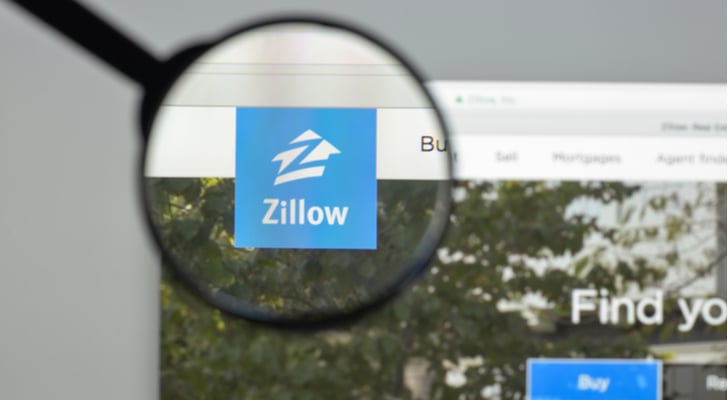Zillow Group, Inc. (NASDAQ:Z) should have had a monopoly in the online real estate listings after buying rival Trulia in 2015 for $2.5 billion. But just as the deal was before regulators, News Corp (NASDAQ:NWS) was buying the owner of Realtor.com, the site of the National Association of Realtors.
So a new rival appeared as Zillow bought out its old one, and the company’s anticipated monopoly never materialized.
Thanks to News Corp, Zillow’s road to monetization has been more difficult and expensive than anticipated. The company has grown its top-line in a booming real estate market, but profits are only now dribbling in.
For the quarter ending in December, for instance, the consensus is for earnings of 19 cents per share on revenue of $278 million. That would represent year-over-year growth of 20% in revenue, but hardly any profit.
Zillow’s Expenses Are Still Rising
The company should be doing better. Gross profit often represents as much as 85% of revenue but selling, general and administrative expenses were turning that profit into loss until recently, peaking in the big June quarter at 70% of revenue.
Holding that down has turned loss into profit, but the profit is meager, and the company has been stymied in its efforts to expand beyond the listings niche.
For instance, a daily fee imposed on posted rentals at Zillow’s StreetEasy site sent traffic plummeting. StreetEasy’s cash cow in New York is a Premier Agent feature which lets agents buy leads. Agents call that illegal advertising. CEO Stephen Rascoff recently flew cross-country to try and iron out relations.
Meanwhile Zillow’s Instant Offers, a service that offers to buy your house when you click on its listing, drew instant competition from Opendoor Networks , with heavy advertisements on local radio.
The basic service has also been subject to legal attack. A New Jersey homeowner filed an antitrust suit against the company, alleging its “zestimate,” an estimate of a home’s value, kept their property from selling. Regardless of the merits, such suits cost money to defend.
Should Be Better
The strange thing is that all of this is taking place against the backdrop of a booming real estate market.
Zillow itself says there is
an inventory crisis in housing, with the average home now costing over $200,000. Residential real estate is now a $31.8 trillion market.
Yet even if Zillow meets its earnings estimates for the current quarter when it reports February 6, it will have barely $1 billion of revenue from that market.
Right now, analysts seem evenly split on Zillow, between those who see the hot market making it a screaming buy and those who see its results making it a meek hold. Morgan Stanley (NYSE:MS) analyst Jonathan Lanterman is among the bulls. He has a $50 price target on the stock and calls it a category winner. The price target is still weak tea when the stock is opening for trade on January 26 at $44.
Rock and Hard Place
When Zillow bought Trulia, there were predictions this would transform the real estate market, creating more direct selling, lowering fees, and ending the cozy relationships that let agents take over 10% of a home’s value each time it’s sold.
That has not happened. The News Corp deal with Realtors has kept Zillow boxed in. Any efforts to go beyond its niche have increased its legal bills. It has not become the Expedia Inc (NASDAQ:EXPE) of real estate. The industry is dug in and successfully resisting change.
Zillow is still a category winner. But that category may be smaller, and much less valuable, than it was thought to be even a few years ago.
Zillow still has a lot to prove.
Dana Blankenhorn is a financial and technology journalist. He is the author of the historical mystery romance The Reluctant Detective Travels in Time, available now at the Amazon Kindle store. Write him at danablankenhorn@gmail.com or follow him on Twitter at @danablankenhorn. As of this writing he owned no shares in companies mentioned in this story.

